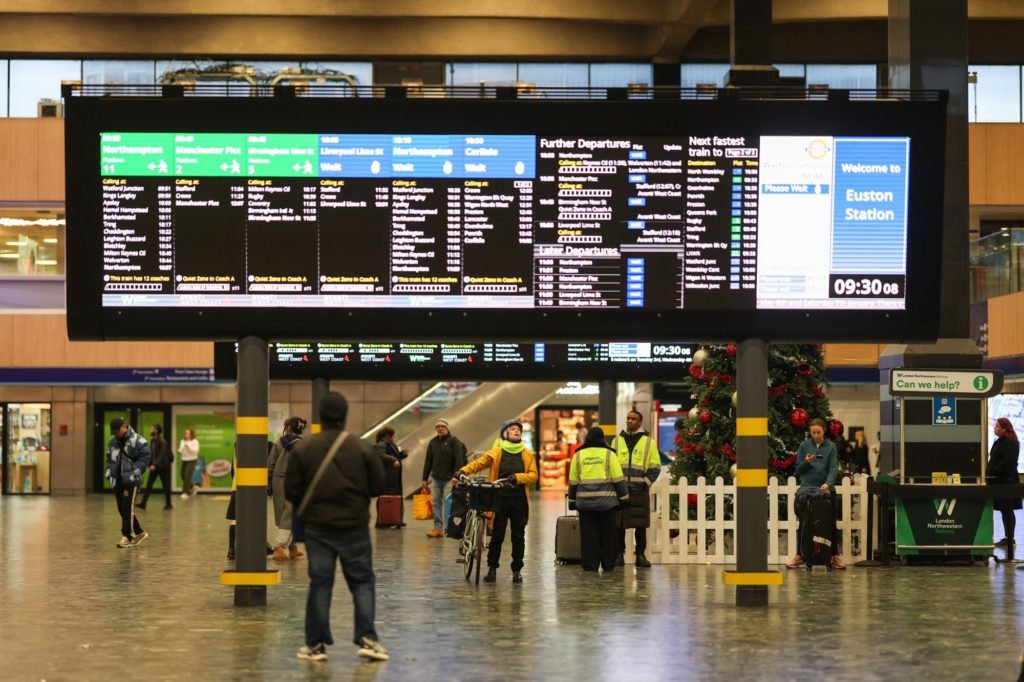Five straight days of strikes will cripple much of the UK’s train network this week as unions ramp up industrial action in a dispute over pay and working conditions.
(Bloomberg) — Five straight days of strikes will cripple much of the UK’s train network this week as unions ramp up industrial action in a dispute over pay and working conditions.
Network Rail has urged the public to “only travel if absolutely necessary,” with many commuters deciding to work from home instead of battling their way to the office.
For some, however, travel is necessary. Here’s a guide to what you can expect if you need to brave Britain’s transport system during the walkouts.
Are there any trains at all?
Yes, some services are running — but at a significantly reduced rate. Eight trains an hour arrived at Victoria on Tuesday morning, compared with 36 during normal times. Waterloo, the UK’s busiest terminal, welcomed 12 trains an hour compared with the usual 47.
Some stations in London’s commuter areas were closed completely while others expected two trains an hour into the city center.
How early can I get to work?
Services during the strike begin later and end earlier than normal. On Tuesday, Wednesday, Friday and Saturday most services into central London won’t start arriving until after 8 a.m.
For example, the earliest trains from Woking and Feltham, in Surrey’s commuter belt to the southwest of the capital, are due to arrive at Waterloo at 8:09 and 8:11 a.m respectively. The first train into Marylebone on these days doesn’t arrive until 9:15 a.m.
At the other end of the day, the last Southern train to Brighton will depart London Victoria at 5:50 p.m. The last trains from Waterloo will also depart before 6 p.m.
Network Rail said people should check the trains they plan to take before traveling.
Are the strikes the same for all five days?
No, four of the days involve industrial action by the RMT union which said 40,000 members were striking at Network Rail and 14 train companies.
On Thursday, the RMT is not on strike — but another labor group, Aslef, said train drivers at 15 train companies would walk out.
Many train companies are running no services at all on Thursday, as a result of the Aslef strike, including Avanti West Coast and the operators of most commuter lines into London. There will be a reduced or extremely limited service on Greater Anglia, LNER, South Western Railway and Great Western Railway.
There are no trains from Marylebone on Thursday or Friday.
Is the Tube affected?
Yes, some London Underground services are hit by the RMT’s strike at Network Rail, especially in the more suburban ends of certain lines.
The District line from Wimbledon to Parsons Green and Richmond to Turnham Green will only run a limited service between 7:30 a.m. and 6 p.m., while there are no services between Queens Park and Harrow & Wealdstone on the Bakerloo line.
The Elizabeth Line, which launched last year, is only running to and from Reading and Shenfield between 7:30 a.m. and 5:30 p.m.
The Overground line is also limited to running trains between 7:30 a.m. and 6 p.m.
How about the buses?
A strike by Abellio workers will disrupt services on Jan. 4-5 in west and south London.
Will it all be back to normal on Sunday?
Unfortunately not — engineering works will disrupt rail services into and out of the capital on the day following the strikes.
How long could this go on for?
The RMT secured a mandate from its members in November for another six months of strikes. “We’ve got a mandate that runs through to May and we would ballot again,” Mick Lynch, its general secretary, said Tuesday.
Lynch said the RMT would consider next week whether to stage more strikes. He blamed the government for destroying talks last month with a “torpedo,” repeating a claim that ministers had inserted a proposal about moving toward driver-only operations. The government blamed the unions for the situation and said Lynch should leave the picket line and return to negotiations.
Transport Secretary Mark Harper told the BBC on Tuesday that “there’s not a bottomless pit of taxpayer money to throw at this problem” and said it was important to find a balance between the interests of transport workers, passengers and the public finances.
–With assistance from Ellen Milligan.
More stories like this are available on bloomberg.com
©2023 Bloomberg L.P.










